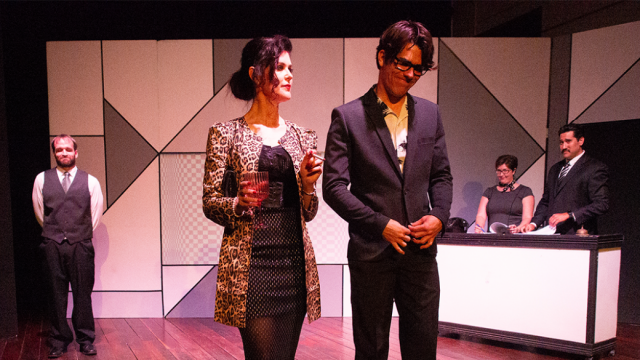The Graduate
The genesis of The Graduate began as the now classic film directed by Mike Nichols back in 1967 – and it was this film (together with Who’s Afraid of Virginia Woolf? which he directed the previous year) that really made his name. And for those who were around at time, it was the film’s soundtrack that unleashed the work of Simon and Garfunkel to the wide world – particularly with the two songs, “The Sound of Silence” and of course “Mrs Robinson”.
There is some difficulty in transforming from screen to stage – as opposed to other way round – and it took some 33 years before The Graduate reached the West End and 35 years before it received a Broadway airing. When a script is cinematic and has such evocative imagery, to adapt this to the stage will always represent a challenge, and given these difficulties, Townsville Little Theatre gave a brave attempt at the play.
For this production, director Sonia Zabala created a geometric design both for the set and the costuming, all in black, white and flashes of red. While this was mostly effective, at times the costume design was at bit at odds with the contemporary setting of the piece – which was emphatically 1964, complete with the morality and social morés of the day, which in itself were clues as to what the play is all about.
Through the telescope of today’s eyes where boundaries are becoming less defined, it is easy to forget just what attitudes existed back then - particularly in matters of sex, language and acceptable behaviour in society. Closer examination and observation of these aspects would have benefitted the play enormously – and the audience’s appreciation of it. And yes, the audience did laugh, but not in the rolling and uproarious way they should have done when reminded of how far we have come. (Or have we?)
This sense of time and place is essential to the comedy (and tragedy?) of the piece, and the production would have benefitted from more intensive work on relationships, greater attention to physical interplay and most importantly establishing the reasons why the characters do the things they do. This would have projected it into another realm of effectiveness and ultimately the audience’s appreciation.
Central to the play is the character of Mrs Robinson, played so definitively in screen by Anne Bancroft (hard to believe that Doris Day was offered the part!). She is an ultimately sad character who is trapped in a loveless marriage and while her character may be sad, she does not know she is. Instead, she seeks fun in whatever guise that may be, whether that be alcohol or dabbling with younger men. In her attempt to remain “sexy” Paula Mandl – an actress who has a commanding stage presence - essentially gave us a languid interpretation which did not show us the multiple nuances of the character - in particular the controlling, manipulative streak and the sense of perverse fun and joy which strangely underpins the sadness.
Most impressive in the role of Benjamin Braddick was Samuel Audas-Ryan, who, after a slow start warmed into the role. This is a young actor with great promise and great stage presence, and together with Sarah Mathiesen’s Elaine Robinson, these were for me the most believable characters – and relationship – in the production. These two young actors displayed stage abilities way beyond their years, and I look forward to seeing them flex their talents in future productions.
In supporting roles, there were good efforts from Julie Johnston as Mrs Braddock, Glenn McCarthy as Mr Braddock, and Gerard Marano as Mr Robinson and a gloriously seedy striptease from Jessie DeVine.
Above all, one has to remember that this is an amateur production. It had its enjoyable moments, but in my view what the entire production needed to get it rolling along was an injection of pace and energy from the start of the play rather than warming up as we went along. It is not enough to rely on the funny line or situation to deliver an ultimately satisfying comedy performance.
Trevor Keeling
Subscribe to our E-Newsletter, buy our latest print edition or find a Performing Arts book at Book Nook.

